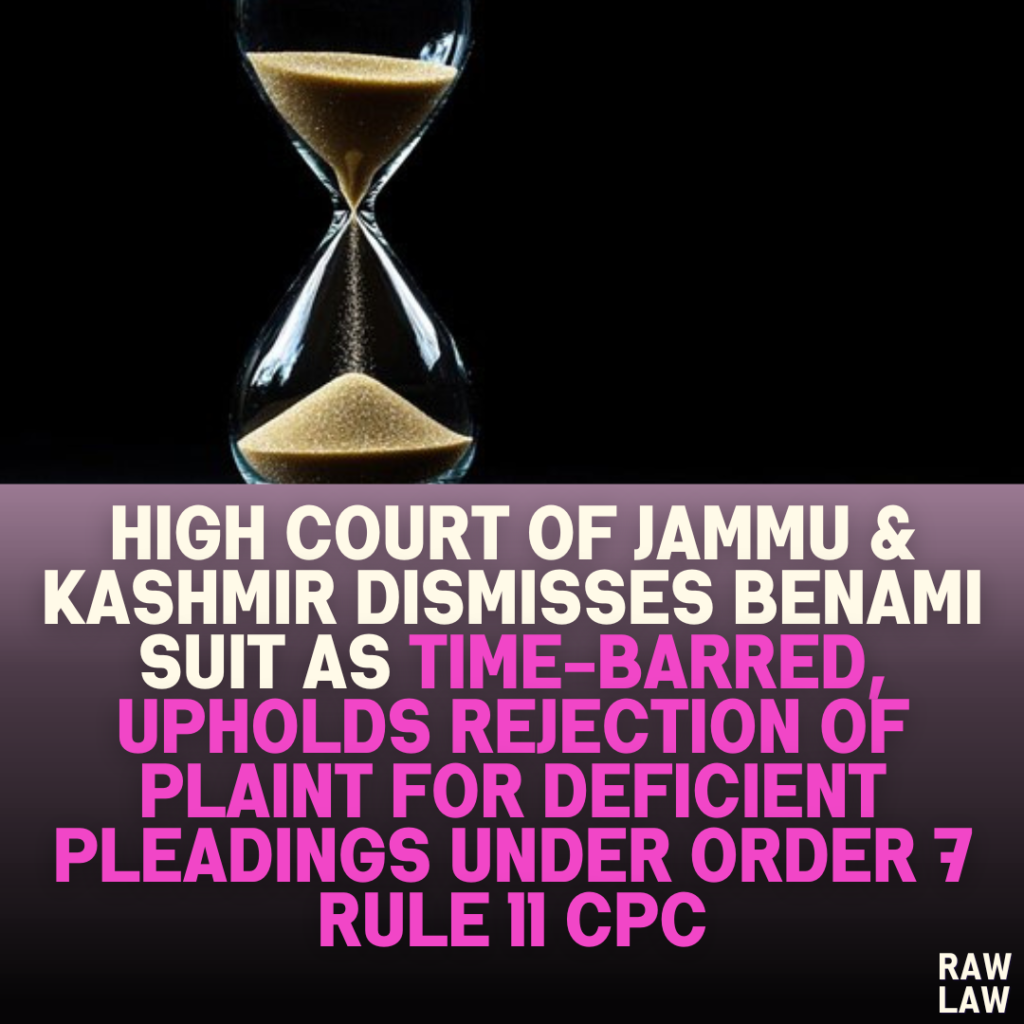Court’s Decision:
The High Court of Jammu & Kashmir dismissed the appeal filed by the appellants-plaintiffs, upholding the trial court’s decision to reject the plaint under Order 7 Rule 11 of the CPC on the ground of limitation. The court concluded that the suit was time-barred and did not provide sufficient cause of action to warrant a trial.
Facts:
The appellants-plaintiffs filed a suit seeking a declaration that a lease deed executed in 1991 between the Jammu Development Authority (JDA) and the respondent was a benami transaction. They claimed that the property in question had been purchased using funds from the joint Hindu Undivided Family (HUF), and they were entitled to shares in the property. The appellants also challenged the power of attorney executed by the respondent in favor of third parties.
The respondents filed an application under Order 7 Rule 11 CPC, arguing that the suit was barred by the Benami Transactions (Prohibition) Act, 1988, as amended in 2016, and also by the law of limitation. The trial court accepted the respondents’ contentions and rejected the suit.
Issues:
- Whether the suit was barred under the Benami Transactions (Prohibition) Act, 1988, as amended in 2016.
- Whether the suit was time-barred and thus liable to be dismissed on the ground of limitation.
Petitioner’s Arguments:
The appellants contended that the Benami Transactions (Prohibition) Act of 2010, as applicable in Jammu and Kashmir, governed the transaction. They argued that the trial court erred in applying the 2016 amendment of the Benami Transactions Act. Furthermore, they asserted that the issue of limitation was a mixed question of law and fact that required evidence to be adjudicated properly.
Respondent’s Arguments:
The respondents maintained that the suit was barred by the 1988 Act, as amended in 2016, which prohibited any claims on benami transactions. They further argued that the suit was time-barred since the lease deed was executed in 1991, and no claim had been made until 2024, far exceeding the permissible limitation period.
Analysis of the Law:
The court thoroughly examined Section 4 of the Benami Transactions (Prohibition) Act, 1988, as amended in 2016, which prohibits claims on property held benami. The court found that the provisions of the amended 1988 Act were applicable at the time of the suit’s filing, not the 2010 Act as argued by the appellants. Additionally, Section 4(1) of the Act specifically barred the suit, as it sought to claim rights over property held in the name of another.
Precedent Analysis:
While the court acknowledged that there were exceptions under Section 2(9) of the 1988 Act, the plaintiffs failed to demonstrate that their case fell within these exceptions. Furthermore, the court cited established precedent that vague or indefinite cause of action claims cannot revive a time-barred suit.
Court’s Reasoning:
The court determined that the appellants’ pleadings were deficient, failing to specify when they first became aware of the alleged benami nature of the transaction. The absence of clear dates or facts supporting the accrual of a fresh cause of action led the court to conclude that the suit was indeed time-barred. The court noted that subsequent knowledge of the building plan approval or caveat filing could not serve to extend the limitation period.
Conclusion:
The High Court upheld the trial court’s decision to reject the plaint, ruling that the suit was barred by limitation. The appeal was dismissed, and the trial court’s judgment and decree were confirmed.
Implications:
This judgment reinforces the strict interpretation of the Benami Transactions (Prohibition) Act, particularly the amendments made in 2016, and emphasizes the importance of filing suits within the prescribed limitation period. Claims that lack specific details regarding the cause of action or that attempt to bypass the statutory limitation through vague assertions are likely to be dismissed.




Pingback: Orissa High Court Denies Regularization for Contractual Employee, Citing Non-Compliance with Reservation Policy, Transparent Selection Procedures, and Violation of Government Guidelines - Raw Law